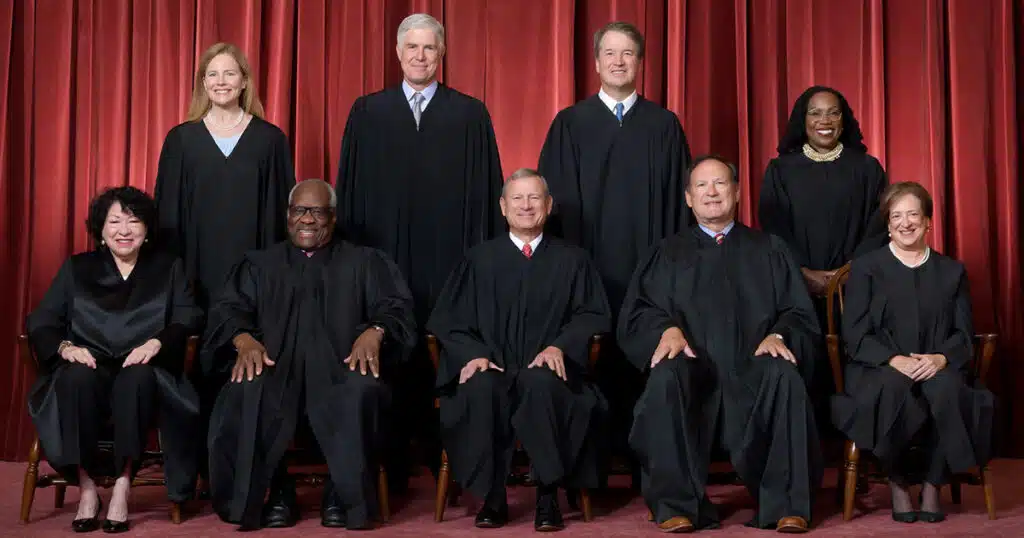
The Black Lining around Loper v Raimondo
The joy amongst folks on the Right over the federal Supreme Court’s overturning of its prior Chevron ruling in 1984 is understandable. It was a terrible ruling that basically allowed federal executive agencies to determine the extent of their own powers. Loper v Raimondo, handed down by the SC at the end of June, rightly ended that bit of lawlessness, but at the same time it reinforced a precedent that is every bit as harmful to justice and limited government: It reinforced the notion that the federal Supreme Court has the final say on what is constitutional and what is not in the United States.
Chief Justice Roberts argues in the majority’s opinion in Loper,
The Framers also envisioned that the final “interpretation of the laws” would be “the proper and peculiar province of the courts.” Id., No. 78, at 525 (A. Hamilton). Unlike the political branches, the courts would by design exercise “neither Force nor Will, but merely judgment.” Id., at 523. To ensure the “steady, upright and impartial administration of the laws,” the Framers structured the Constitution to allow judges to exercise that judgment independent of influence from the political branches. Id., at 522; see id., at 522–524; Stern v. Marshall, 564 U. S. 462, 484 (2011).
This Court embraced the Framers’ understanding of the judicial function early on. In the foundational decision of Marbury v. Madison, Chief Justice Marshall famously declared that “[i]t is emphatically the province and duty of the judicial department to say what the law is.” 1 Cranch 137, 177 (1803). And in the following decades, the Court understood “interpret[ing] the laws, in the last resort,” to be a “solemn duty” of the Judiciary. United States v. Dickson, 15 Pet. 141, 162 (1841) (Story, J., for the Court). When the meaning of a statute was at issue, the judicial role was to “interpret the act of Congress, in order to ascertain the rights of the parties.” Decatur v. Paulding, 14 Pet. 497, 515 (1840).
This is the standard argument we’re all fed in our school textbooks – the Supreme Court in DC gets the final say. But like a lot of things in those books, which are mostly written by a bunch of Leftists who love all-powerful, centralized governments, it isn’t true. Nowhere in the federal constitution is the final interpretive power granted to the federal courts. That was something John Marshall dreamt up when he was Chief Justice. Such a power does not, in fact, lie anywhere in the federal government. Thomas Jefferson, in his famous Kentucky Resolutions of 1798, written in response to the federal Alien and Sedition Acts that had made criticism of the federal government a crime, explains where that power lies and why:
- Resolved, That the several States composing, the United States of America, are not united on the principle of unlimited submission to their general government; but that, by a compact under the style and title of a Constitution for the United States, and of amendments thereto, they constituted a general government for special purposes, delegated to that government certain definite powers, reserving, each State to itself, the residuary mass of right to their own self-government; and that whensoever the general government assumes undelegated powers, its acts are unauthoritative, void, and of no force: that to this compact each State acceded as a State, and is an integral part, its co-States forming, as to itself, the other party: that the government created by this compact was not made the exclusive or final judge of the extent of the powers delegated to itself; since that would have made its discretion, and not the Constitution, the measure of its powers; but that, as in all other cases of compact among powers having no common judge, each party has an equal right to judge for itself, as well of infractions as of the mode and measure of redress.
The States themselves are the final judges, by virtue of the fact that they set up the federal government.
The flip-side of that coin is that the States therefore have the duty to stop unlawful actions of the federal government from impacting their citizens. James Madison authored the Virginia Resolutions of 1798, also in response to the Alien and Sedition Acts, which declare this without any hem-hawing:
That this Assembly doth explicitly and peremptorily declare, that it views the powers of the federal government, as resulting from the compact, to which the states are parties; as limited by the plain sense and intention of the instrument constituting the compact; as no further valid that they are authorized by the grants enumerated in that compact; and that in case of a deliberate, palpable, and dangerous exercise of other powers, not granted by the said compact, the states who are parties thereto, have the right, and are in duty bound, to interpose for arresting the progress of the evil, and for maintaining within their respective limits, the authorities, rights and liberties appertaining to them.
And if the State governments fail to act, then local governments must take up the mantle: sheriffs, county/parish governments, mayors, city councils, school boards, etc.
The federal Supreme Court correctly saw the danger in allowing federal bureaucrats to be judges in cases in which they were a party. But they ignore the danger of allowing their own Court to be a judge in controversies involving federal constitutional questions. As a department of the very same federal government, they have a conflict of interest. The justices are not disinterested parties. As the Anti-Federalists pointed out during the ratification debates, they would be tempted to enhance federal power with their rulings as a covert way of enhancing their own prestige.
It behooves us not to be too enamored with the judiciary; justices are political creatures, too, the same as legislators, governors, and so on. They are liable to fallen human passions like the rest of us, and therefore mistakes and abuses from them must be guarded against, also. Checks upon their power are not unheard of in history. There are even some mild ones in the federal constitution, though they are rarely spoken of – impeachment and limitation of jurisdiction. Other countries have had more robust protections. The House of Lords not so long ago was able to hear appeals even after England’s high court had ruled on a question of law. And when there were still plenty of Christian kings around in Europe, many of them could be appealed to as a court of last resort even after the judiciary had heard a case (this makes sense, as the judicial departments in most European countries were established by the kings themselves to make sure justice was being done for folks in their absence).
Kritocracy (rule by judges) isn’t what the States were aiming for in their separation from Great Britain. Most of them wanted a mild government that mixed together the best elements of monarchy, aristocracy, and democracy. That balance of elements has been lost, as the judiciary and the executive bureaucrats have gained far too much power. Loper was a good corrective for the obese executive, but the federal judges remain a pile of bricks on the scale (and they want it to continue to be that way!). The States, who have been acting more like the sovereigns that they are lately, will need to help further correct the balance, and all the more so as the beneficial laws they have been passing against trans mutilation surgeries, social media censorship, etc., are still being dragged before federal judges and vetoed without good reason.



